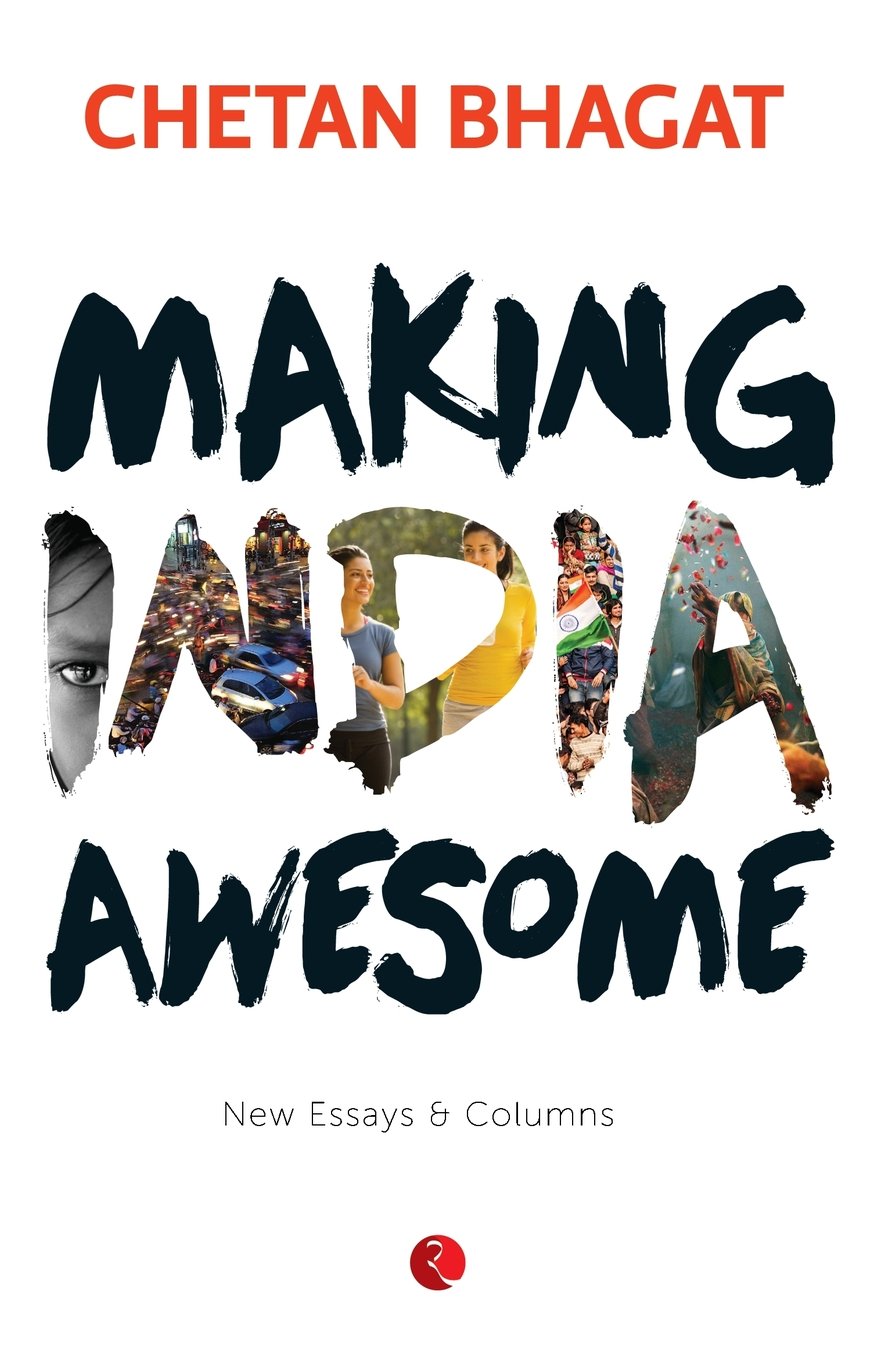‘Making India Awesome’ is a 2015 book written by Chetan Bhagat. It is a collection of essays and columns written by him, and which expressed Bhagat’s views and vision for India. He highlights the problems existing in contemporary India which obstruct it from being ‘awesome’ and it feels like a new wave of excitement for a reader like me who has read only his fictional works. This is quite a good realistic point of view.
To be honest, I was initially disinterested by the book. But soon, the content and the author’s strong views dragged me to like this book and agree and oppose the content at various occassions. More than actually reading the book, we are reading into the personality of the author, a calm and composed Chetan Bhagat who is using his rationality and liberal mind. As he emerged into issues, some of which are seldom discussed, we see the bravery of the man who is using a honest language and occasionally variables to give a complete analysis of India.
The book begins with the categorization of the Indian youth into 3 categories via the 80/20 rule or the Pareto Principle, which I would say is almost accurate. Even though we often see our grandparents and parents talk of Indian politics and society, seldom do we see the youth getting any interested in it, opting to go for his/her own future, you couldn’t blame him/her for that. Indian politics is messy, as any.
But the first place where I felt the author placing an emphasis onto is in putting some amount of blame onto the citizens rather than wholly on the politicians. It’s quite an agreeable fact, though I felt the author quite emphasized that to some extent. The overall message is, we choose to not care and stand for the politicians to exploit us. But, don’t think the book is entirely onto placing blames or citing problems; Bhagat endorses the idea of proposing solutions along with problems, and this is a continuous trend that we can see in almost any article, except for ones where some deliberation is required.
The book on India’s problems and solutions cannot be complete unless generalizations are removed and specific cases are cited, and that’s what Chetan has done here. Quoting case studies such as the Maggi case, Godhra riots or the 2012 Delhi gang rape case, such real life occurrences bring out what India is like. Now, though these have been mentioned, there has not been any intent to explain on it more, and a person who is not aware of these incidents are prone to just imagine something and move on or research on his/her own. Some background information could have been provided.
Also, I felt a bit of repetition in some columns, for eg. A part of ‘Rahul’s New Clothes, and the Naked Truth’ is again repeated in ‘Swacch Congress Abhiyan: Some Essential Steps’.
There were times when I disagreed with the views of the author. In ‘Basha Bachao, Roman Hindi Apnao’, for example, he suggests the radical change of shifting to Roman Hindi, though I felt a vernacular language acquired its true meaning in it’s own style better. And quoting another, in ‘Home Truths and Career Wives’ and ‘Wake up and Respect Your Inner Queen’, he accuses the movie ‘Cocktail’ of being sexist while on the contrary I felt it to go the opposite route. These, however cannot be seen as flaws as opinions are subjective and unique.
What I liked about the book:
- The book quite showcases the author’s rational and liberal mind which bravely discusses some of the top issues in India.
- The ideas conveyed were straight-forward and impacting.
- The sole story ‘Once upon A Beehive’ gave a good visualization on Chetan’s view of the Indian society.
- Unlike providing questions mostly, the author has opted to providing answers to the problems as much as he can, and it's appreciable.
What I didn’t like about the book:
- The author hasn't gone far to detail certain events or provide background information regarding scanerios mentioned in the book, eg the Godhra Riots. Assuming the reader is informed enough to understand may not be the right route always.
- There were bits of repetition of the same facts between chapters.
- In the chapter 'Basha Bachao, Roman Hindi Apnao', there is the radical concept of a shift towards Roman Hindi. But any linguistic change doesn't take place in a short period of time. It is a progression whose route changes along with other socio-cultural fashions. Thus, advising a society which still predominantly learns these languages in the current form in which it exists to change its ways just to adjust with the online world seems impractical.
- Chetan accusing the film 'Cocktail' of showing major traces of patriarchy and sexism seems absurd as it doesn't seem nearly close.
The straight-forward, rational and liberal approach of Chetan Bhagat which is displayed in the book is a thing which the Indian society needs to adapt, at least upto some extent. After 4 years of the books’ publication, we can see that though many of the subjects of his columns haven’t been taken into action, some have been moved forward and deliberated on, and that’s a good thing.
